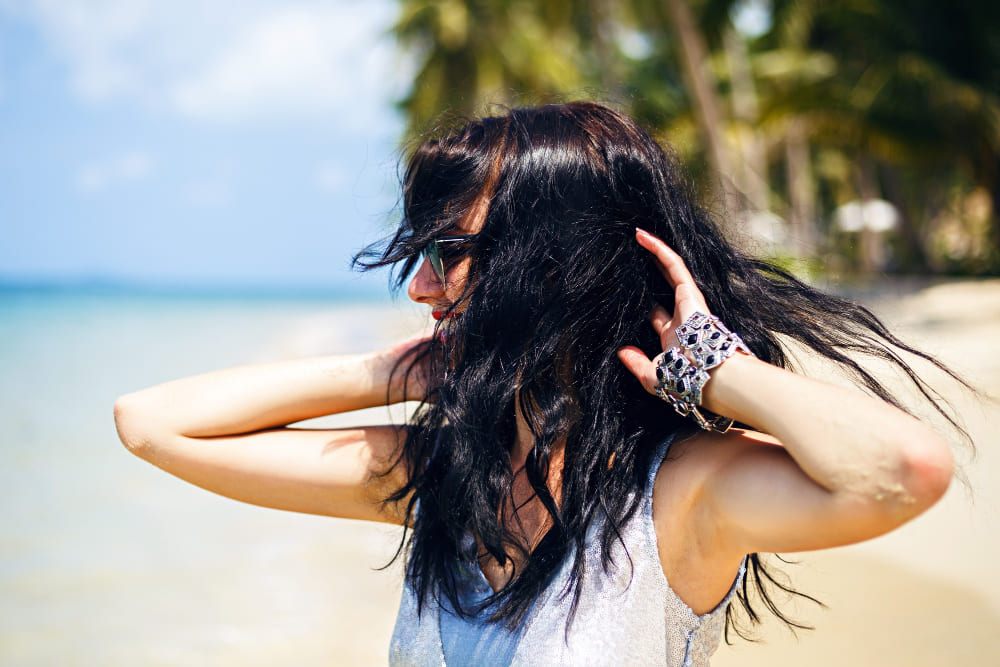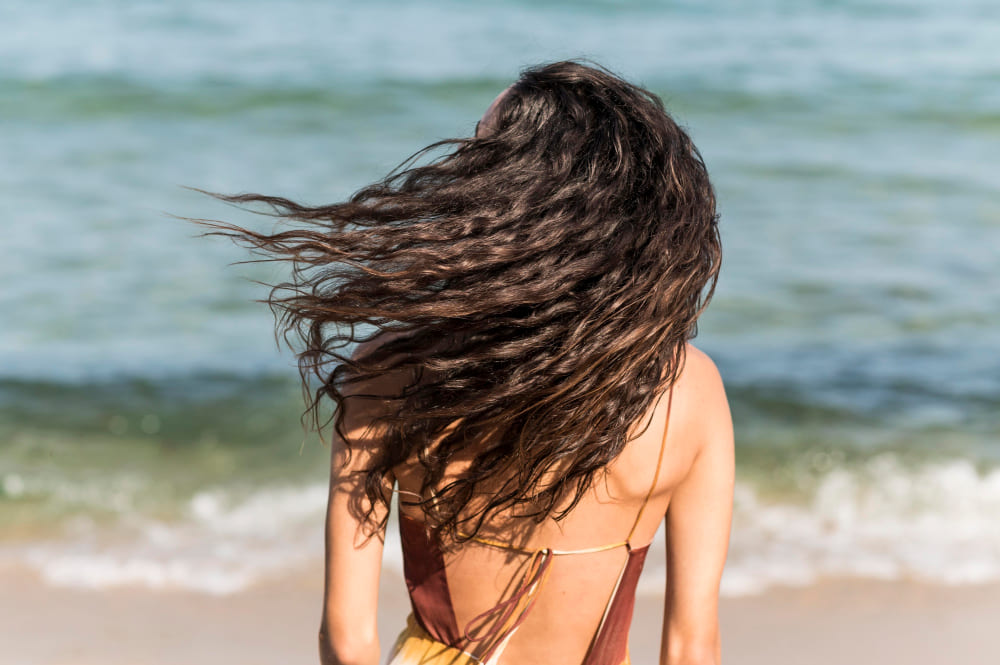Sunshine is great for your mood, but not for your hair. Similar to your skin, your hair is also vulnerable to UV rays, leading to sun damage in hair, color fading, and dry texture. Whether you’re going to the beach for the day or just running around in sunny weather, sun protection for your hair should be part of your daily beauty routine.
Imagine your hair to be a piece of clothing — would you simply leave your favorite silk scarf out in the sun all day? Healthy hair can lose its strength and shine if exposed to the sun without protection. The best part? You can soak up the sun with just a few simple steps without sacrificing your hair’s look and health.
Why You Need Sun Protection for Hair
Excessive sun can cause damage to the hair by breaking down the protein structure and losing its natural oils. This usually results in sun-dyed hair — a condition where hair becomes lightened or color changed as a result of UV exposure, rather than color treatment. Even more so, constant exposure may lead to sunburn hair, burning your scalp, and making your hair limp.
And the signs of sun damage don’t always strike right away — sometimes they sneak up on you gradually, and you are left wondering why your hair is brittle, dry, or lifeless. The sun invisibly erodes your hair, especially if it is already been color-treated or chemically processed. Don’t worry: knowing the signs means you can address it sooner.
Signs of sun damage to hair:
- Apparent lightning or brassy color (especially on colored hair)
- Dry, brittle, or straw-like texture
- Too much frizz and breaking of ends
- Redness, flaking, or itchiness on the scalp
- Loss of elasticity and luster
Attending to these warning signs at the onset is the beginning of better hair care.
The Impact of the Sun’s Rays on Hair
The suns rays can dry out your scalp, fade your hair color, and leave your hair looking dull. If you have spent time choosing the perfect shade (check our best hair color for grey hair guide), you’ll want to protect your hair from the sun to keep it vibrant. Damaged cuticles also make hair more prone to breakage and split ends — two common hair problems we cover in depth in our Vitamin A for hair growth article.
And it is not just about aesthetics — sun exposure can speed up aging of the hair shaft, leading to long-term thinning and fragility. Whether you color your hair or not, protecting it from the sun helps maintain both strength and shine. A little care now goes a long way in keeping your strands healthy, hydrated, and full of life.
How to Protect Hair from Sun Exposure
Your hair needs the same care from the sun as your skin. Too much UV can weaken strands, turn hair color blond, and dry out. If you’re headed to the beach, out running errands, or just playing outside, a few precautions make all the difference. These easy habits keep your hair shiny, healthy, and colored and prevent sun-damaged hair. Here are five simple ways to protect your hair from the sun, not part of any complicated rituals.
Wear a Scarf or Hat
Physical sun blocking is the simplest. A large hat or lightweight scarf not only reduces hair risk of sunburn but also covers your scalp. Use light material such as cotton or linen to stay cool and prevent irritation. Bonus: it is also the best way to add a nice touch to your summer style while keeping your hair safe.
Also, hair covering can reduce exposure to dust and pollution, which can dry and dull hair. For curly or textured hair, it also locks in natural moisture. Try switching up styles throughout the week — bucket hats, silk scarves, or straw hats all offer stylish protection. Just make sure the fit is comfortable and doesn’t flatten or tug at your roots.
Use UV Protection Sprays
Special sprays offer hair protection against UV damage. Apply one before stepping outside, especially if you’ve recently colored your hair or have signs of sun damage hair already. Look for sprays with added nutrients like keratin or vitamin E for an extra boost. Reapply throughout the day if you are spending extended time outdoors.
These sprays are usually light and won’t weigh down your hair or make it greasy. Some of them even work as heat protectants, giving you protection while using hot tools to style. Tuck a travel-sized bottle in your beach or pool bag. Think of it as SPF for your hair — it is just as important.

Avoid the Highest Sun Points
Attempt to avoid direct sunlight between 10 AM and 4 PM when UV radiation is highest. Your hair and scalp will appreciate it. If you have no choice but to be out at this time, find shade and use other protection techniques in combination. Much like your skin, your hair requires a reprieve from strong UV rays to remain healthy.
Excessive exposure to the sun dehydrates hair cuticles, making your hair brittle and prone to breaking. For outdoor events, attempt to hold parties during early morning or evening hours. If not possible, dress up with a hat and UV spray for extra protection. This is a good habit for your overall health, too — less exposure to the sun equals less possibility of heat stroke and skin injury.
Weekly Deep Condition
Moisturizing repairs broken hair and fortifies strands. A weekly deep conditioning treatment restores moisture and fortifies hair against environmental stressors. Choose a product containing moisturizing ingredients like coconut oil, shea butter, or aloe vera. Leave on for 20–30 minutes to allow your hair to soak up everything.
For the best results, drape your hair in a hot towel or shower cap during treatment — this opens up the cuticles and increases absorption. Overnight treatments can also be employed for additional moisturizing if your hair is extra dry. If you spend a lot of time outdoors, doubling the frequency to twice a week can make a dramatic difference. Regular deep conditioning also smooths frizz, making styling much easier on hot summer days.
Rinse Hair After Swimming
Seawater and chlorine increase the effect of sunlight. Use freshwater to rinse your hair after swimming to avoid build-up and reduce the sun-damaged hair effect. Where applicable, condition with a moisturizing conditioner or leave-in treatment. This is a quick action that maintains hair elasticity and stops your color from fading.
Even a quick rinse beneath a beach shower can keep long-term damage at bay. You also carry a spray bottle with fresh water and a little conditioner for emergency in-transit touch-ups. When you swim regularly, apply a clarifying shampoo once a week to wash away grime without dehydrating your scalp. And don’t forget — washing your tresses in clean water before you even get into the pool prevents chlorine soak-through in the first place.
How Sun Exposure Accelerates Hair Aging
Sun damage not only affects the appearance of your hair but also speeds up the natural aging process of your hair fibers. UV radiation kills the keratin protein that is the structural backbone of each hair fiber, ultimately causing loss of elasticity and strength. This ultimately results in greater brittleness, broken ends, and slower growth.
Additionally, sunlight can harm lipids and moisture in your hair shaft, making it more porous and prone to environmental toxins and heat damage. For colored or chemically treated hair, sunlight increases fading and dryness, usually resulting in patchy tones and rough texture. By understanding how the sun causes hair to age prematurely, you can then better realize the importance of daily sun protection and specialty hair care routines.

Final Thoughts
Learning sun protection skills for hair is not limited to summer. Your hair can suffer sun damage at any time of the year, making practicing sun protection for hair every day worthwhile. With some minor changes, you can protect hair from the sun, prevent sun damage hair, and keep your hair healthy, whether it is summer or not.
UV rays damage hair structure, strip color, and dry out your scalp and locks, too. Sun exposure, even on cloudy days, builds up with the years, just like they do on your skin. A wide-brimmed hat or a scarf creates a physical barrier and makes you look stylish, too. You also have shampoos and other hair care products containing built-in UV filters that shield your hair with minimum extra effort. Look at transitioning to moisturizing conditioners and shampoos for sunnier seasons to balance out dryness. Regular maintenance equates to not having to reverse harm later, and your hair remains healthy and vibrant all year long.
Discover more tips and expert-backed solutions for hair problems on HairSocial. Your hair deserves just as much care as your skin — and we’re here to help every step of the way.


Leave a Reply